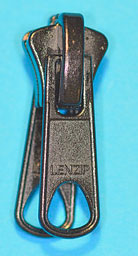Zippers
Garage door screens zippers are designed to provide an additional layer of protection against pests and outdoor elements while allowing ventilation and natural light to flow through your garage.
A crucial component of garage door screens is the zipper, which allows easy access to the garage while keeping the screen securely closed.
As a company that prioritizes customer satisfaction, Garage door screens want our customer’s zippers to last for years because we understand the inconvenience and frustration that comes with a malfunctioning or broken zipper. A faulty zipper not only reduces the functionality of the screen but also compromises the security it provides.
Proper usage and maintenance are essential in extending the life of a zipper. When using a zipper, ensure that it is fully opened or closed before pulling the slider. Attempting to force the slider through an unaligned zipper can damage the teeth, leading to a broken zipper. Also, avoid overloading the zipper beyond its recommended capacity.
To maintain your zipper, clean it regularly to prevent dirt and debris from getting stuck between the teeth. Lubricate the zipper with a silicone-based lubricant to reduce friction and prevent corrosion. Store your screen in a cool and dry place to prevent rust and other forms of damage.
In conclusion, a zipper is a vital component of a garage door screen. To ensure its longevity, proper usage and maintenance are crucial. At Garage door screens, we believe that a well-maintained zipper provides a seamless user experience and enhances the functionality of our screens.
We use molded tooth zippers are made from DuPont Delrin UV stable resins. Additionally, the tape of the molded tooth zippers are UV protected to resist yellowing and degradation and lasts for years
Many zipper manufacturers will incorporate regrinds into their resin products. Regrinds are scrap plastic material that is reused to reduce costs. This practice adversely affects the molecular structure of the resins and results in a final product that is more susceptible to a weak product and premature failure. Here at Garage Door Screens we use only zippers made100% virgin resins and never regrinds or uses sub-standard resin materials.
Here at Garage Door screens we only use double pull rust proof metal slides Autolock Double Pull (#8 Gauge)
Standard locking function on both sides of the slider.
Information on our zipper supplier
Applications: Standard slider as used for the Marine Industry for boat top covers and other canvas work requiring accessibility from both sides of the zipper.
Our garage door screens feature the Autolock Double Pull (#8 Gauge) with a standard locking function on both sides of the slider. This is the same standard slider used in the Marine Industry for boat top covers and other canvas work requiring accessibility from both sides of the zipper. In fact, LENZIP zippers are the best quality zippers tested and certified by leading manufacturers. They have even been used at Cape Canaveral and named by manufacturers as the sea-worthy zipper.
We take pride in using only high-quality materials for our garage door screens, and the LENZIP zippers we use are no exception. They are built to the highest standards for long, trouble-free service under demanding applications. When you choose our garage door screens, you can rest assured that you are getting a product that is reliable, durable, and of the highest quality.
The term “#8 zipper” refers to the size of the teeth on the zipper, which are measured in millimeters. A #8 zipper typically has teeth that are 8mm wide when the zipper is closed.
The #8 zipper is a medium to heavy-duty zipper that is commonly used for applications such as jackets, bags, and outdoor gear.
The dimensions of a #8 zipper vary depending on the manufacturer, but in general, the teeth width (the part of the zipper that interlocks to close the zipper) is around 8mm (or 0.315 inches) and the tape width (the fabric strip that the teeth are attached to) is around 1 inch. The overall length of the zipper can vary based on the application it is used for, and can range from a few inches to several feet.

